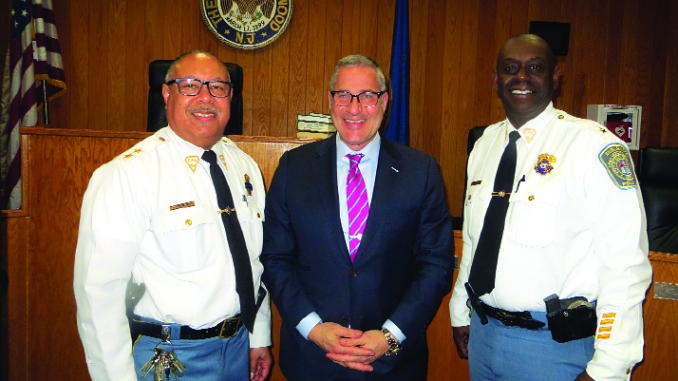
ENGLEWOOD, N.J.—On April 15, “Safety and Security” was the topic of discussion at Englewood Mayor Michael Wildes’ Town Hall meeting at the municipal courthouse featuring Police Chief Lawrence Suffern and Deputy Chief Gregory Halstead.
The overarching question asked by Wildes was “Is Englewood a safe place?”
Suffern assured that it is, noting that Englewood has excellent resources and partnerships in place for public safety as well as a police department that does a wonderful job.
“It does have some challenges at times, and we are overcoming those challenges,” he said.
Suffern gave an informative presentation with tips for personal safety and securing your home and your vehicle. He also gave information about scams and identity theft and spoke about police reporting.
Personal Protection
To protect yourself, Suffern emphasized people should always be aware of their surroundings, know who is around, stay in well lit and populated areas, and walk with another person when possible. Always have your keys prepared when approaching your home or auto, he said.
Securing your home
Gadgets and lighting may help keep your home safe. Use both interior and exterior lighting when inside or away from the home, along with remote-controlled lights and motion detectors, Suffern said.
Remove or trim foliage from areas that may allow a person to conceal themselves, and lock doors and windows when leaving your home, he said.
Mechanisms can be used to restrict the amount of space a window can open, and alarm systems can also protect your home when you’re not there.
Securing your vehicle
When parking your car, leave it in a well-lit area, Suffern said.
Always remove all keys and key fobs from the vehicle, and lock the doors and windows. Valuables should not be left in plain sight—including cellular phones, GPS units, computers and tablets.
It’s also important to remove garage door openers or disable remote access, all accessory cords, loose change and money, and purses, briefcases and shopping bags.
Tips for avoiding scams
To avoid a scam, it helps to know what you’re looking for.
Common types of phone scams include:
• Lottery scam—when a caller asks for good faith money to cash a winning lottery ticket.
• IRS scam—A caller says that you owe the IRS money and if you don’t send it, you will be arrested. The call may come from a number that looks like a legitimate law enforcement agency, such as the Sheriff’s Office. The caller will then advise you to send payment via a money card or a wire transfer.
Deputy Chief Halstead also discussed the use of Bitcoin in scams. You can identify this as a scam because all legitimate IRS inquiries come in the mail, not by phone.
• Injured family member scam—A caller may say that a family member is injured and payment is needed for an emergency procedure. Check to see if that person is actually at home or in a safe location.
• Home scam—An individual convinces the person they need to fix a part of their home siding, roof or masonry. The scammer takes a deposit for the job and never returns. This scam is often perpetuated on seniors.
• A diversion scam takes place when someone is assessing repairs to your garage or driveway, while his partner enters your home and steals valuables.
Protecting against identity theft
Private data is more vulnerable then ever with the proliferation of online banking. Here are tips to stay safe:
• Cut up and shred documents with sensitive personal information.
• Never give out personal information or a credit card number to an unsolicited caller.
• Do not purchase unsolicited merchandise on the phone. You can always ask the caller to send you written information.
• Password protect files on your computer that contain sensitive personal information.
• Carefully review all statements from your bank, credit card, home and cell phone every month.
• Never leave your wallet or purse unattended.
• Monitor your credit report regularly to look for accounts you didn’t open and charges that you did not make. You can get a free annual credit report from Equifax, Experian and Transunion.
• If you see anything fraudulent or suspicious, notify the credit bureau.
Police protect and serve
In addition to taking personal precautions, the local police provide a safety net for citizens.
You can call the Englewood Police Department at (201) 568-2700 for non-emergency calls. (Always call 911 for emergencies).
If you’re calling police, an operator will ask the nature of your call and the location of the incident. Provide your name and contact information. Ask for the name and ID number of the operator. You can call anonymously if you request to do so. If you feel a call has been handled inappropriately, record the date, time and the operator’s ID and report it to the chief of police.
As Chief Suffern concluded his remarks, he directed everyone to take information sheets that were on a table and he gave the police department contacts.
After the presentation, Wildes asked attendees to submit questions on written cards. He read off over a dozen inquiries that were answered by both Suffern and Halstead.
Topics included: how to lower the level of violent crime, how to establish a citizen neighborhood watch, police department outreach into the Latino community, effectiveness and use of shielding vests, rule of monitoring radio frequencies, and sensitivity training for police officers, among others.
Wildes thanked and praised the two chiefs.
“They have distinguished themselves with many, many years of service here,” the mayor said.
He also thanked members of his Community Outreach Committee for publicizing the meeting and he recognized the community leaders present, including Councilwoman Cheryl Rosenberg, NAACP Bergen County President Jeff Carter and Englewood Library Director John Arthur.
